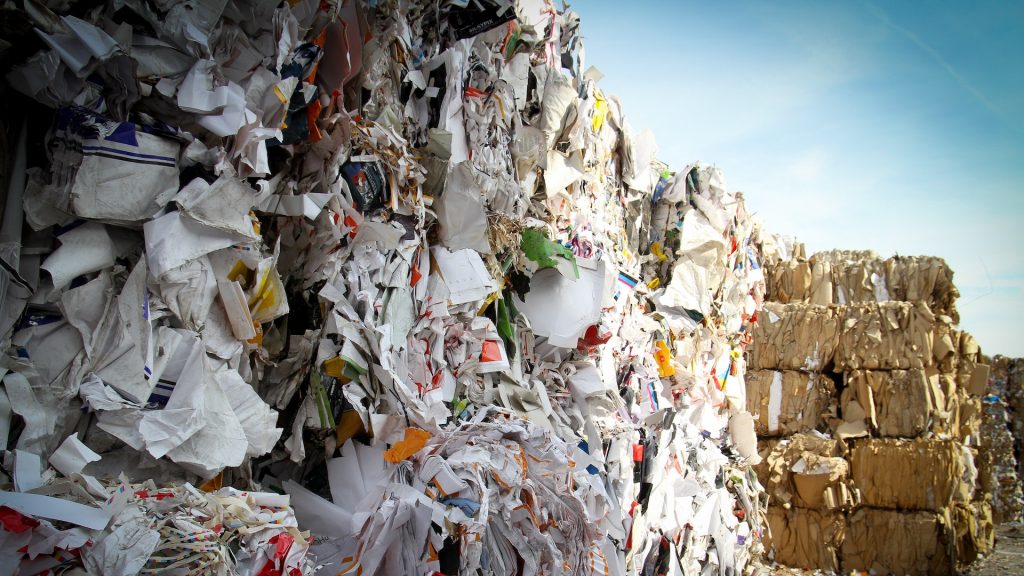
By Kathleen Wong | Rewire
As we live our lives ordering dinner from Postmates, going to bars with friends and grabbing coffee before work, how often do we actually stop and think about just how much trash our lifestyles produce?
Don’t worry, we’re not asking you to sift through your trash can. The average American citizen creates around a whopping 4.4 pounds of trash a day, which makes the United States the leader in producing trash, according to the Environmental Protection Agency.
As for what happens to trash when it hits the landfill or dump? Well, the short answer is not much. In these oxygen-lacking environments, trash — even something organic like an banana peel — takes an incredibly long time to decompose.
The effects of having too much trash on this earth are, as you can probably guess, deadly — to both the earth and the health of animals, including us. Landfills produce methane and carbon dioxide, which are harmful to our health and the environment. Plus, food waste in landfills can harm animals who eat it, impacting our planet’s biodiversity. The list goes on and on.
Thankfully, there are simple, affordable lifestyle adjustments that anyone can make to shrink their waste footprint. These changes won’t break the bank but will help you live more sustainably — and not even realize it. Heck, some of these changes might even save you some money in the process.
1. Reuse, seriously
This one’s pretty obvious, but reusable items are a surefire way to cut down on your trash levels. It can go beyond having a reusable water bottle and coffee mug, too. Look into menstrual cups, an alternative to tampons and pads, and reusable food wraps, which are made of compostable beeswax.

But the best place to use reusable stuff? At the grocery store! Bring your own mesh produce bags instead of using the plastic ones that come off of the roll. Avoid packaging as much as possible — pack your own containers when purchasing anything from the deli or bulk aisle foods. A tip: use old pasta jars for the bulk aisle.
Of course, bring your own totes so you don’t have to use plastic bags when checking out. If you do end up in possession of a plastic bag, make sure to reuse it.
2. Rethink packaged products
Along with shopping in the bulk aisle, you can avoid filling your trash can with empty cardboard and plastic packaging by heading to the local farmer’s market for produce, meat and fish that’s fresh and most likely unpackaged. However, shopping this way can be more expensive.
On that note, avoid packaging in your bathroom, too, by opting for soap bars, which don’t leave you with a plastic bottle, recyclable stainless steel razors and compostable bamboo toothbrushes, Ecophiles editor Namrata Bhawnani said.
3. Make your own
In fact, why don’t you just revamp your toiletries all together by dropping some of the store-bought stuff? Make your own toothpaste and deodorant using coconut oil.
It’s also incredibly easy to whip up your own non-toxic household cleaners, thanks to the help of vinegar and essential oils.
4. Opt for cloth
Forget about paper towels and choose to clean and dry with cloth instead, environmental consultant David Ambrogio said. The benefits are twofold: they’re eco-friendly and, as a one-time purchase, they’ll save you money.
“These napkins can be used again and again — all you need to do is throw them in the washer once a week with your clothes and they’ll be ready to go again,” he said.
5. Cut junk mail
In America, junk mail is pretty ubiquitous, as is tossing it away. About 44 percent of junk mail is left unopened and destined for a landfill.
Stopping junk mail from reaching your mailbox is incredibly easy, thanks to websites like DMAchoice.org, which removes you from mailing lists, Ambrogio said.
6. Forget fast fashion
Though the price tags can be tempting, fast fashion, clothing made cheaply and not to last, has deadly repercussions on our planet’s health.
Not only do the factories that make these clothes treat their workers poorly, but a recent report by the Ellen MacArthur Foundation stated that the textiles industry has higher rates of greenhouse gas emissions than both international shipping and aviation combined. On top of that, the industry almost never recycles materials.
Cut down on your fast fashion by thrifting and buying from sustainable brands. Now might be the time to invest in a capsule wardrobe.
7. Reimagine takeout
Food delivery services like Postmates and Seamless are definitely convenient for when you’re hungry and not able (or not in the mood) to make food yourself.
However, the plastic utensils, paper napkins, plastic containers and disposable bags create a lot of trash for just one meal. We’re not saying you have to cook every meal forever and ever, but when you do call for takeout, consider picking it up yourself and bringing your own reusable container or bag to transport the food in. It might seem silly at first, but just think about how many single use plastic items you’ll be avoiding.
8. Start composting
Food scraps and yard waste take up about 30 percent of what goes in our trash cans, according to the Environmental Protection Agency. That statistic can be magically erased from your waste footprint when you compost.
While some people think keeping their old banana peels will lead to an unpleasant stench and even more unpleasant bugs, that’s not the case if you compost correctly. Check out the EPA’s tips for composting, and look into local resources. There might be a community garden near you that collects frozen food scraps.
9. Bye, straws
Here’s a mindlessly easy one: when going out or dining out, just say no to straws when you order your drink. If you must use a straw, bring a reusable one with you.
![]() This article originally appeared on Rewire.
This article originally appeared on Rewire.
© Twin Cities Public Television - 2019. All rights reserved.
Read Next



